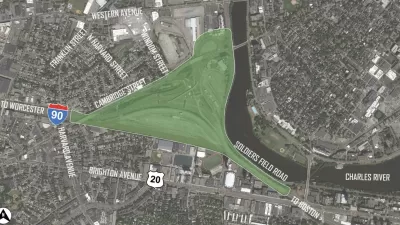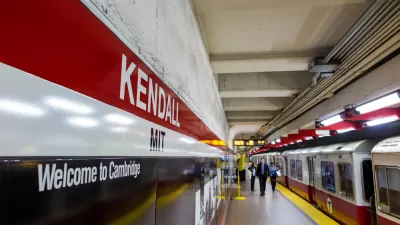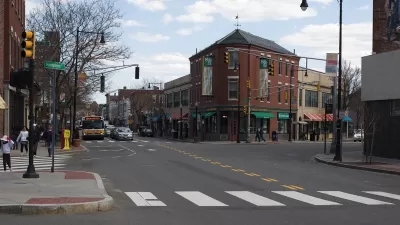Efforts to expand bicycle-friendly infrastructure across the country have revealed the importance of comprehensive planning. Peter DeMarco reports on ways in which planners in the Boston area are trying to fill in the gaps in their emerging network.
The Boston area has caught bike fever. With biking on the minds of politicians and residents throughout the region, DeMarco asks what it will take to transform Boston into a world-class bicycling region like Copenhagen.
Perhaps the largest barrier to creating more bicycle-travel incentives is a lack of comprehensive planning. Like our highways, mass transit systems, and even our pedestrian pathways, bicycle transit operates on a network, and for that system to operate efficiently, gaps and bottlenecks need to be eliminated. In the Boston region, "the area has a bicycling network that is hardly a network at all. Filled with interrupted paths and lanes and incomplete trails, it's a system of stops and starts." Bridging the gaps in Boston's system, like the nicely-named "Lost Half-Mile," could be "[t]he biggest boost to regional cycling."
DeMarco explains what it will take for Boston to become a bicycling mecca: "it will take more than just better infrastructure...We'll need workplaces that provide showers, developers to incorporate bike access from the street and storage racks into design plans, cooperation and respect between cyclists and motorists, police enforcement of cycling rules, bigger trail maintenance budgets, better signage, more cycling education programs, and a mental shift toward making bike trips, be they long or short, part of our daily lives."
FULL STORY: Biking to the future in Boston

Alabama: Trump Terminates Settlements for Black Communities Harmed By Raw Sewage
Trump deemed the landmark civil rights agreement “illegal DEI and environmental justice policy.”

Study: Maui’s Plan to Convert Vacation Rentals to Long-Term Housing Could Cause Nearly $1 Billion Economic Loss
The plan would reduce visitor accommodation by 25% resulting in 1,900 jobs lost.

Planetizen Federal Action Tracker
A weekly monitor of how Trump’s orders and actions are impacting planners and planning in America.

Restoring Northern India’s Himalayan ‘Water Temples’
Thousands of centuries-old buildings protect the region’s natural springs and serve as community wells and gathering places.

Milwaukee to Double Bike Share Stations
Bublr Bikes, one of the nation’s most successful, will add 500 new e-bikes to its system.

DC Extends Application Window for Outdoor Dining Permits
District restaurants will have until the end of November to apply, but businesses with permits in rush hour parking lanes must end operations on July 31.
Urban Design for Planners 1: Software Tools
This six-course series explores essential urban design concepts using open source software and equips planners with the tools they need to participate fully in the urban design process.
Planning for Universal Design
Learn the tools for implementing Universal Design in planning regulations.
Caltrans
Smith Gee Studio
Institute for Housing and Urban Development Studies (IHS)
City of Grandview
Harvard GSD Executive Education
Toledo-Lucas County Plan Commissions
Salt Lake City
NYU Wagner Graduate School of Public Service





























